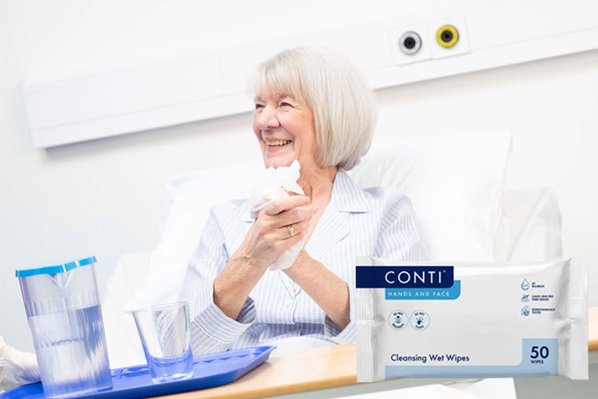
How do we improve patient hand hygiene?

How do we improve patient hand hygiene?

We are all aware more than ever of the importance of consistent and effective hand hygiene, and considerable correlations have been found between hand hygiene and the rate of infections, such as vancomycin-resistant enterococci and Staphylococcus aureus.1
Good hand hygiene is promoted by the NHS for nurses, doctors, and other healthcare workers, but there is often one important group of people forgotten about - the patients.
Patient's hand hygiene is just as important as healthcare workers when it comes to reducing the rate of healthcare-associated infections, but for many bedbound or inactive patients, it can be an extremely difficult experience for what may appear to be a simple task.
Why is hand hygiene a problem for bedbound care receivers?
We often take for granted easy access to a sink for traditional soap and water hand washing when we need to, but for bedbound and immobile care receivers, this is not the case. A care receiver with restricted or no mobility cannot easily move from their hospital or residential bed to a sink, and in many hospital and healthcare facilities, sinks and handwashing facilities are not next to a bed but positioned at the end of a room for communal use. A 2022 WHO report identified that half of healthcare facilities globally lack basic hygiene services with soap and water where patients are receiving care.2
With this in mind, it isn't difficult to understand why only 13% of acute care patients undertake pre-meal hand hygiene.3 Here are just some of the reasons why a care receiver may not undertake good hand hygiene practices.
Unable to access a sink before or after meals
As highlighted , sink access is rarely directly next to a bed so moving patients to a sink before and after meals is quite a timely task for healthcare workers, and can bring discomfort to a bedbound patient through the need to handle and lift the patient into a wheelchair or similar transport device and back again.
Toileting may take place using a commode or bedpan by a bedside, so sink access is still limited
Many immobile or bedbound care receivers may receive toileting assistance via a commode or a bedpan by their bedside and not in a toilet, therefore the sink access is still limited and isn’t easily accessible.
Alcohol gels may be accessed but should only be used after physical contamination is removed
A care receiver or giver may have access to alcohol gels near their bedside, however these should only be used once any physical contamination or soiling has been removed from the skin. The CDC outlined that while hand sanitisers may be a suitable solution for hospital visitors for example coming into potential contact with germs, when hands are soiled or greasy, for example when handling food, they are unlikely to penetrate and effectively remove the bacteria.4
Caregiver resource to assist
Healthcare workers are increasingly under an immense amount of pressure with many care receivers to attend to, the realistic prospect of being able to transport all bedbound or immobile patients to and from a sink before and after any meals, and/or any additional needs, is unlikely.
What is the solution?
Both hospital patients and residents within long term care facilities derserve to experience the clean hands feeling before and after every meal, before and after toileting, and at any other point during their day where they may feel unclean. A pre-impregnated hand and face wipe easily accessible on a tray table or bedside table, for the patient to use independently or the care provider to assist, is the perfect solution to improve hand hygiene practices and reduce the risk of infections through unclean hands.

During the Covid-19 pandemic in 2020, the Infection Prevention Society advocated the use of disposable cloths and making hand wipes easily accessible for all care receivers. The Conti® Hands and Face Wipe, available in 50 and 200 packs, is ideally suited for convenient in between care for when access to traditional hand washing at a sink isn't available. The lightly fragranced wipes leave skin feeling fresh, and they have also been dermatologically tested to be suitable for everyday use on the most sensitive or fragile skin.
An accessible Conti® Hands and Face wipe can help to significantly increase the uptake of patient's hand hygiene, and work to decrease healthcare-associated infections.